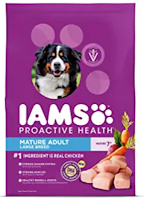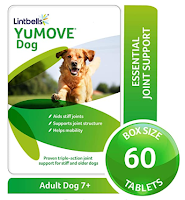The Best Food For Your Senior Dog
What is the simplest food for my senior dog?
When a beloved pet ages, its eating habits and dietary needs change. If your reading this then perhaps it is time to review your senior dog’s diet.
Complete senior pet foods are created together with your pet’s life stage in mind and tailored to make sure your dog is receiving all the nutrients required to market a cheerful and healthy life. It's no secret that older pets' nutritional requirements may change, therefore, it's recommended to vary to a senior/mature food when your pet reaches a particular age.
Below is a spread of premium senior/mature dog foods which are available at AMAZON:
Proactive Health Senior Dry Dog Food
- It contains one (1) 30 lb. bag of IAMS PROACTIVE HEALTH Mature Adult Large Breed Dog Food with Chicken
- Farm-raised chicken is the first ingredient in this formula and promotes muscle support in aging dogs
- Supports healthy energy with wholesome grains that provide essential nutrients and carbohydrates
- Helps maintain a strong immune system in mature adult dogs with antioxidants like vitamin E and beta-carotene
- Formulated with essential vitamins and minerals to meet the specific nutritional needs of senior large breed dogs
- Crunchy kibble that helps reduce plaque and tartar buildup as your large breed senior dog chews
- Wholesome grains provide essential nutrients and carbohydrates for healthy energy
Proactive Health Adult Dry Dog Food for Healthy Weight - Chicken
- Contains one (1) 38.5 lb. bag of IAMS PROACTIVE HEALTH Adult Healthy Weight Dry Dog Food Chicken
- Veterinarians recommend IAMS... we’ve got your dog’s diet down to a science
- Made with real farm-raised chicken
- Supports healthy metabolism with L-Carnitine
- 20% less fat vs. IAMS Chunks recipe to help with healthy weight management and control
- Promotes strong muscles with premium-quality lean protein
- A tailored blend of wholesome fiber and natural prebiotics for healthy digestion
At what age should I switch my adult dog to senior food (and is that this really necessary)?
The answer to the present question will depend considerably on the breed and health of the dog. Smaller dogs tend to mature faster and, after reaching maturity, begin to age more slowly. a touching dog like a poodle, terrier or Chihuahua isn’t considered senior until much later than a bigger breed, (maybe 10 or 12 years old), and therefore the giant breeds are considered “senior citizens” at 5 or 6. Most vets, though, consider a dog of seven or 8 years and older to be a senior.
As a dog's age, their health and stamina slowly decline. Their bodies lose the power to repair themselves and maintain normal body functions, and that they struggle to adapt to the stresses and changes in their environment. additionally, around age 7 for many dogs, and age 5 for large breed dogs, metabolism slows down and therefore the dog requires fewer calories (although some require more if they need digestion problems).
While senior foods may help dogs to measure happier and healthy lives, they're not necessarily the proper choice for an older dog with health problems. If your older dog has specific health problems (such as failing kidneys, diabetes or poor nutrient absorption in his gut) it'll enjoy a diet that caters specifically thereto problem, and your vet is going to be ready to advise you in these cases.
Routine veterinary exams and blood testing can help determine what diet is best for your older dog, and since each pet manufacturer features a slightly different understanding of "senior", the age at which you modify to senior food will depend largely on the brand you select.
What are the characteristics of an honest senior diet for dogs?
The older dog will need an honest, well-balanced diet that's lower in calories, higher in fiber and has adequate protein and fat. for a few older dogs, you'll still feed their regular food, but during a smaller quantity. Specially formulated senior diets are lower in calories and help to make a sense of fullness. If your dog has significantly decreased kidney function, then a diet that's lower in protein will lower the workload for the kidneys. Lower fat usually translates to lower calories; numerous senior diets have a fat level of around 8 to 12%. Older dogs are more susceptible to develop constipation, so senior diets are higher in fiber at around 3 to five. If your senior dog will eat dry food, it'll help to regulate tartar build-up and reduce gum disease.
Can I still feed my senior dog with adult food?
In general, if your senior dog has no medical problems, isn't overweight, and is active, your dog may remain on the adult diet it's wont to. If you've got questions regarding which food to feed your senior dog, contact your vet.
Should I give my senior dog supplements?
Aging dogs have special nutritional needs then some will enjoy supplements. as an example, an outsized percentage of older dogs suffer from arthritis and may enjoy vitamins and supplements, like chondroitin and glucosamine for his or her joints, like Yumove for dogs, if combined with weight control and therefore the proper exercise plan.
- IMPROVE YOUR DOG’S MOBILITY — a flavorsome all-natural supplement for stiff and older dogs, perfect for all dog breeds. Scientifically proven to improve mobility within 60 days!**
- GLUCOSAMINE & NATURAL CHRONDROITIN — supports joint structure for your dog. Manganese supports collagen formation in cartilage, tendons, and ligaments, which helps maintain healthy joints
- SOOTHES STIFF JOINTS — our advanced formula provides a super-concentrated source of Omega-3s, which is proven to soothe stiff joints and contains up to 11x more Omega-3s*** than competitor products!
- PROMOTES MOBILITY — Hyaluronic Acid reaches the joint within two hours, supporting lubrication and shock absorption. Vitamins C and E maintain joint mobility and help prevent premature aging
- WE’VE HELPED OVER 1 MILLION DOGS — we’re proud to be the UK’s #1 veterinary joint supplement brand*, keeping dogs active with tasty chews developed by leading vets and scientists — made in the USA!
A vitamin or mineral supplement is typically recommended if your older dog isn't receiving adequate amounts through his food, which may occur if your dog isn't eating an entire diet. A supplement can also benefit some older animals that tend to require fewer vitamins, minerals, and electrolytes through the intestinal tract, and lose more of them through the kidneys and tract. Finally, some older animals eat less (due to conditions like an oral disease) and should not receive their daily needs of vitamins and minerals.
A fiber product like wheat bran can also tend to assist reduce the incidence of constipation if it occurs. Talk together with your veterinarian to work out which supplements could also be beneficial for your dog.
What should I do if my senior dog won’t eat?
Most importantly, if your dog is losing weight and not eating well, he should have an entire veterinary exam to rule out any possible disease problems. If everything checks out, then you will need to require steps to switch your dog's diet.
Some older dogs suffer from a scarcity of weight gain and disinterest in food. If a dog normally eats dry food, he may have decreased consumption because he features a hard time chewing the massive kibble. By feeding a kibble with smaller pieces, moistening the food with water or adding nutrient-dense canned food you'll make the food easier to chew. Adding other foods can increase the appeal; try adding touch water from canned tuna or a little amount of cooked chicken. Homemade diets of boiled rice, potatoes, vegetables and chicken with correct vitamin and mineral supplements work well with others. Ask your veterinarian for a homemade diet recipe that would be best for your dog. don't attempt to formulate one yourself, because the vitamin and mineral levels are critical. Some dogs like to eat cat chow, but this could be avoided since it's too high in protein.
















0 comments:
Post a Comment